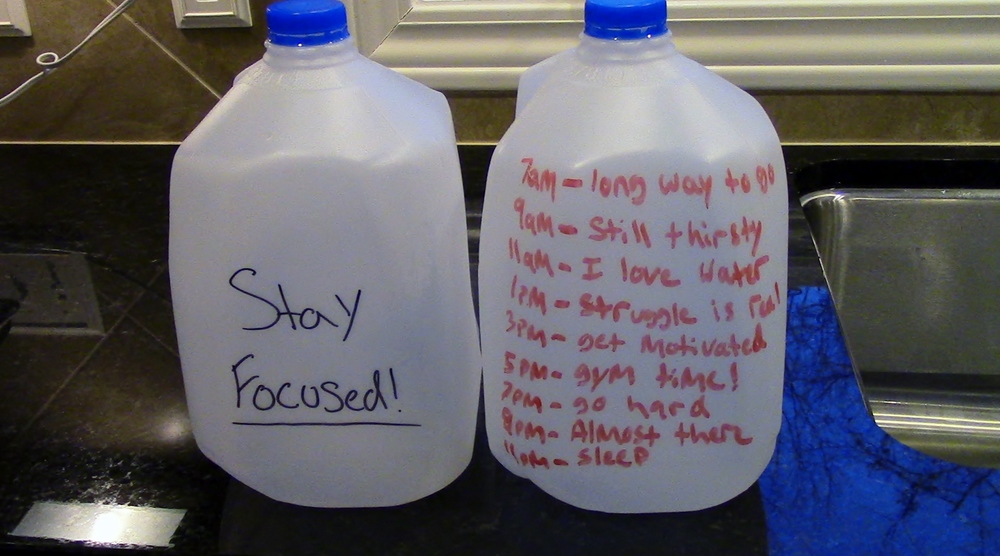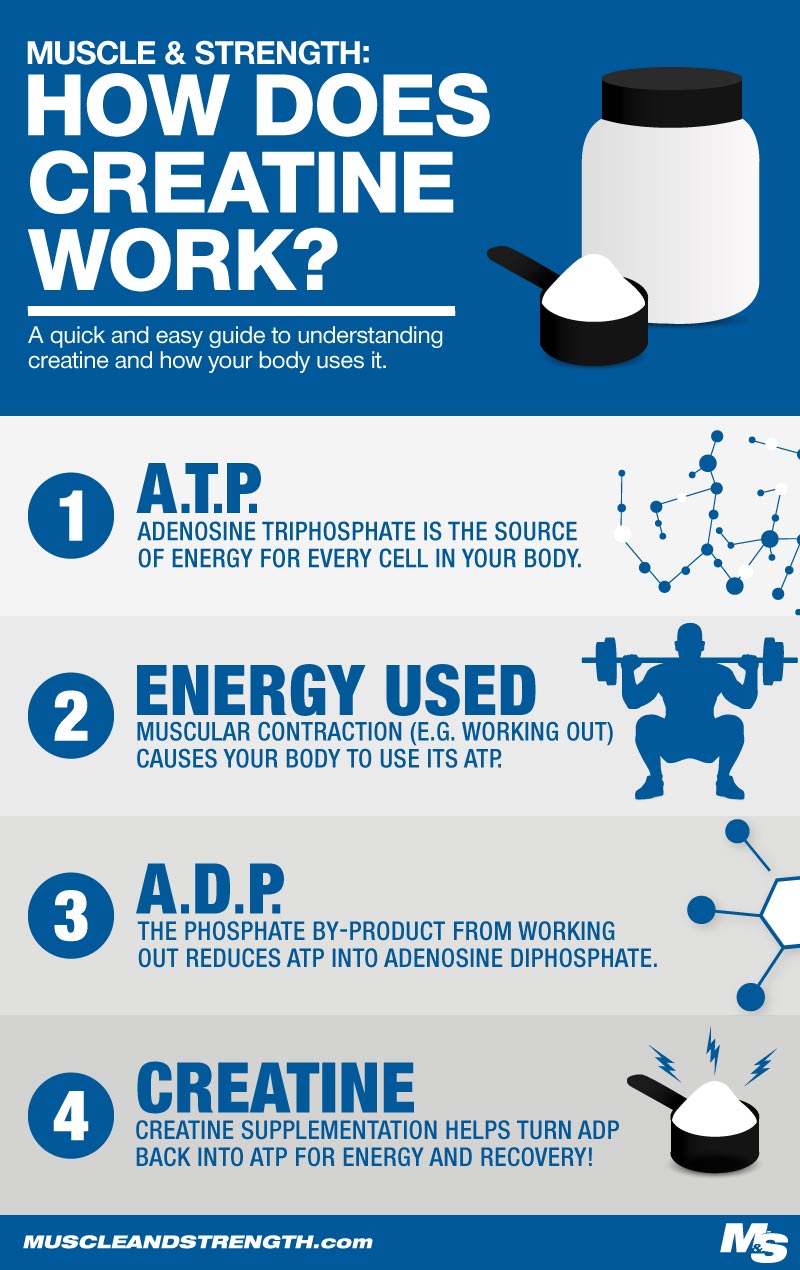Creatine is one of the most popular muscle-building supplements out there, and for good reason. Creatine is an effective compound to get the most out of your workouts and aid your muscles in recovering more quickly. However, it is important to get enough water when taking creatine, to avoid the side effects. These side effects can include dehydration, muscle cramps, and stomach discomfort.
Let’s start with a look at creatine, how it works, and why there is a need for taking in a surplus amount of water when supplementing with creatine.
How Much Water Should I Drink?
There are several “broscience” rumors going around in the fitness community about needing to drink anywhere from 1-3 gallons a day and if you don’t you’re going to get dehydrated and pass out. These unsubstantiated fitness tips are not only unnecessary but can be harmful.
Drinking too much water could over-dilute the sodium in your bloodstream. Low blood sodium can cause muscle twitches, delirium, and even lead to coma and death. The maximum amount of water you can drink daily, according to the American College of Sports Medicine, is 12 quarts (or 3 gallons).
The best indicator of hydration is your own body. If you feel thirsty, drink water. It is very hard to over or under-hydrate if you drink water every time you are feeling thirsty until the point that you are no longer thirsty. If you’re chugging water to the point where it’s uncomfortable, stop. One of the most important concepts in fitness and health is to listen to your body, hydration is no exception.
If you want to put numbers on it, drink 2 glasses of water before training and 1 glass of water for every 15 minutes of training to ensure proper hydration – but know that these are not requirements, and your body may need more or less water depending on the intensity of your exercise regimen. Outside of training, the recommended 6-8 glasses a day will suffice, if you want to get in the habit of counting them off and getting your body accustomed to steady water intake.
If you’re also using a pre-workout, you’ll want to slightly increase your water intake, as some pre-workouts have a high caffeine content and can act as a diuretic. This will increase the number of times you urinate in a day, and you’ll need to replace all that water that’s being flushed out.
Creatine and Water
One reason why creatine is popular is that it not only helps you have better workouts to build muscle, but it makes muscles look more full on its own. This is partly why novice lifters attribute creatine with more muscle growth than they’re actually achieving, and when they cycle off of creatine that retained water leaves their muscles and they don’t appear as full as when they were on it.
In general, most lifters will put on 4-7 pounds in the first week of using creatine due to the amount of water pulled from the bloodstream and transported to the muscles.
This effect of pulling water from the bloodstream and pouring it into your muscle tissue, of course, means that there is less water available to the rest of your body, which is why staying hydrated is important. If you’re not taking in an adequate amount of water while on creatine, there’s a chance you could become dehydrated.
Many of us are guilty of not drinking enough water, but maintaining a rigorous exercise regimen can be dangerous if you’re not maintaining an adequate level of hydration. This hydration requirement becomes more serious with the supplementation of creatine, as it draws water into the muscle and leaves less available water in the bloodstream.
The effects of dehydration can be mild to severe, including symptoms such as muscle cramps, dizziness and nausea. Dehydration is a serious matter, but as long as you’re drinking enough water, you’ll be just fine.
What Is Creatine?
Creatine is an organic acid that is present in all vertebrates and naturally occurring in the body. Creatine aids the body in being able to produce bursts of energy that are rapid in nature. Rapid bursts of energy are required in activities such as plyometric training, high-intensity interval training, and weight lifting.
Creatine is used by a large percentage of the fitness community, and it is available at any supplement or vitamin store. Creatine is available for purchase in powdered form, or in pre-portioned capsules. There is such a thing as liquid creatine, but it is generally low-quality and not recommended for use. If you’re cautious about the brand, make sure to read the reviews and go for one of the best-sellers.
Creatine has been the subject of a large number of scientific studies. This is partially due to the FDA becoming stricter on ensuring the safety of supplements and applying rigorous standards to supplement companies and manufacturers.
One of the reasons that creatine is so widely used is the fact that the effects of creatine have been shown to be almost entirely positive. When creatine helps your body produce these short, rapid bursts of energy, it speeds up the contraction of your muscles. In addition to this, creatine helps your muscles fatigue more slowly and recover faster.
Stronger muscle contractions and slower fatigue help you to increase the quality of your workouts, causing your muscles to grow faster. With the decreased recovery time, you can get back in the gym faster to hit the iron again.
Check out the below infographic from Muscle & Strength for more details:
Final Thoughts
Supplementing with creatine can be an efficient way to add some volume to your muscles, boost your workout and pack on some lean mass. However, supplementing with creatine, or combining creatine with a pre-workout without proper hydration can have harmful side effects by way of dehydration.
Make sure you’re drinking enough water throughout the day, and especially when training by drinking when you are thirsty and not drinking more than 3 gallons per day. So take a scoop of that creatine, grab your water bottle and hit the weights!


BY far the best advice I have read on creatine supplementation, particularly with respect to water intake requirements.
Extremely vague in answering the question, with no substantial quantitative numbers given. How about instead of saying to drink 6 ‘glasses’ of water give us actual units… ie. 8 fl oz
Well, the reason he is not giving an exact amount is because we all have different bodies, and different needs and activities. He literally says; “Just listen to your body, drink when you feel thirsty”. It’s not as simple as just giving an exact amount…
very well said sir!